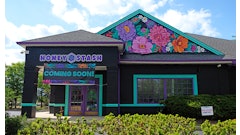
Sales numbers are going up, and prices are coming down.
That’s the story of New Jersey’s still young but maturing state cannabis market, where licensed cannabis dispensaries broke a statewide quarterly sales record with $206.2 million reported for the three-month period ending Sept. 30, 2023, according to the state’s Cannabis Regulatory Commission (CRC).
This quarterly pace equates to a roughly $825-million annual run rate for sales, as New Jersey is on pace to be the 12th largest retail market in the nation among its adult-use peers in 2023.
“New Jersey’s market continues to grow,” CRC Executive Director Jeff Brown said during the commission’s regular meeting Dec. 7. “For the first time in history, legal cannabis sales in New Jersey eclipsed $200 million in the third quarter of 2023. That includes just shy of $177 million of adult-use sales and just shy of $30 million of medicinal sales.”
New Jersey’s adult-use sales, which launched April 21, 2022, accounted nearly 86% of all sales for the third quarter of 2023, as the state’s medical market continues to shrink following expanded opportunities for consumers.
Specifically, the state’s $29.2 million in medical sales from Q3 2023 represents a 52% decrease compared to Q3 2022. And New Jersey’s 93,924 medical cannabis patients as of Dec. 6, 2023, represents a major drop from the 120,000-plus patients in September 2022. These numbers also represent a shift toward the adult-use market.
Notably, adult-use sales hit an all-time high of $59.8 million in October, representing a 25% increase over $47.8 million in January sales.
As sales have increased, the average flower price dropped to roughly $354 per ounce at adult-use retail, representing a 10.5% decrease from January’s average price of $396 per ounce.
Flower has accounted for roughly 42% of New Jersey’s adult-use cannabis sales in 2023, while vape carts (29%), edibles (14%) and prerolls (9%) represent the other leading categories, according to CRC.
And as these prices continue to come down, more and more cannabis consumers will transition to the licensed market, Brown said.
“One interesting piece of data, because we’re seeing prices come down, the growth in overall sales numbers—so when we look at total sales revenue—it’s gone up 27 percent [from January to October],” Brown said. “But when we look at the differences sold in total grams of product, that’s actually increased by 40 percent.
“So, because prices are starting to come down, the growth in total sales is not reflective of the total growth of the market. We are seeing, year-to-date, 40 percent growth in sales when it comes to grams. So, that shows that as prices come down, more and more people are coming into the legal market and are purchasing legal cannabis.”
The more grams sold means more money for the state’s impact zones, which include municipalities that have a history of “higher concentrations of law enforcement activity, unemployment, and poverty, or any combination thereof,” in relation to past cannabis prohibition policies, according to CRC.
In 2023, New Jersey’s Social Equity Excise Fee (SEEF) is levied at a rate of $1.52 per ounce of cannabis, which is due on each usable ounce sold by a cannabis cultivator. The majority of this tax revenue is reinvested into the state’s impact zones.
After Brown provided his sales report, CRC board member Charles Barker asked the executive direct how many businesses that are majority owned by Black, Indigenous or Hispanic people had opened dispensaries in recent months, specifically since March 2023.
“I think it’s imperative that we understand and monitor whether Black, Indigenous and Hispanic majority owned applicants are receiving an equitable share of the awards that are being granted,” Barker said. “So I understand if you don't have that information today; we can address it at a subsequent meeting.”
When New Jersey’s adult-use sales commenced in April 2022, they did so via 12 dispensaries owned by seven of the largest publicly traded cannabis companies in the industry that were existing operators in the state’s medical market. The goal at the time was to get the adult-use retail program up and running in a timely fashion in an effort to stamp out unregulated sales.
But on the one-year anniversary of that launch, New Jersey still had zero Black-owned dispensaries outside the medical market, and Barker, at that time, had pushed for delaying the approval of more licenses for companies not diversely owned in an effort to promote an equitable marketplace.
In April 2023, there were 24 dispensaries statewide serving the adult-use market.
As of early December, there are 64 licensed dispensaries serving the adult-use market, including 36 retail facilities that sell both adult-use and medical cannabis and another 28 that are licensed for adult-use sales only, according to the New Jersey Office of Information and Technology. Another 12 retail facilities are medical-only cannabis stores.
Although the CRC staff has put an emphasis on awarding licenses to social equity operators and those who live in the state’s impact zones, becoming operational hasn’t necessarily come quickly for aspiring market entrants.
RELATED: Power in Partnership: The Story of Simply Pure Trenton
“When we looked at the awards in September, we were outpacing population for Black or African American and I believe Asian ownership,” Brown said. “And we were, I believe, not consistent with population for Hispanic or Latino, and I’m not sure from the others. But that report looked at all of the awardees, both majority ownership, total number of persons of interest against all persons of interest in the industry. I’m happy to break that out in January by those that are operating and who have been issued a license versus those who are still in the implementation process.”
Among the 2,357 cannabis license applications submitted to the CRC as of Nov. 28, 2023, 1,649 had been approved. The majority of those are for aspiring dispensary operators.
When Brown provided a quarterly update in September, 68% of annual licenses awarded were to diversely owned businesses.


























